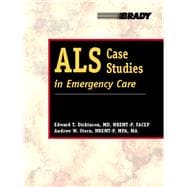
Note: Supplemental materials are not guaranteed with Rental or Used book purchases.
Purchase Benefits
Looking to rent a book? Rent DICKINSON ALS SCENARIOS _p1 [ISBN: 9780130943170] for the semester, quarter, and short term or search our site for other textbooks by Dickinson, Edward T., ,Medical Editor; Stern, Andrew, NREMT-P, MPA, MA. Renting a textbook can save you up to 90% from the cost of buying.
| Preface | p. IX |
| Acknowledgments | p. XI |
| Medical Emergencies | p. 1 |
| Acute Chest Pain | p. 3 |
| Acute Myocardial Infarction | p. 7 |
| Acute Myocardial Infarction with Bradycardia | p. 12 |
| Acute Severe Asthma Exacerbation | p. 18 |
| Acute Stroke | p. 23 |
| Anaphylaxis | p. 28 |
| Cardiac Arrest | p. 34 |
| Catheters/PICC Lines | p. 41 |
| Cocaine-Related Chest Pain | p. 45 |
| Congestive Heart Failure | p. 50 |
| Dehydration | p. 56 |
| Diabetic AMS | p. 61 |
| Chronic Renal Failure | p. 66 |
| Difficult Intubation | p. 71 |
| Facilitated Intubation | p. 78 |
| Hypertensive Crisis | p. 83 |
| Hypothermia with Altered Mental Status | p. 87 |
| Meningitis | p. 91 |
| Overdose | p. 95 |
| Pain Management | p. 100 |
| Poisoning | p. 106 |
| Post-CABG Surgery | p. 112 |
| Seizure | p. 117 |
| Sudden-Onset Tachycardia | p. 123 |
| Syncope | p. 129 |
| Trauma and Surgical Emergencies | p. 135 |
| Amputation | p. 137 |
| Blunt Chest Trauma | p. 142 |
| Burns | p. 147 |
| Cervical Spine Injury | p. 151 |
| Head Injury | p. 155 |
| Blunt Multiple Trauma | p. 161 |
| Ruptured Abdominal Aortic Aneurysm | p. 166 |
| Shock in Penetrating Injury to the Chest | p. 170 |
| Stab Wound | p. 176 |
| Trauma Arrest | p. 180 |
| Special Situations | p. 187 |
| Advance Directives | p. 189 |
| Attempted Suicide | p. 195 |
| Care under Fire | p. 200 |
| Child Abuse | p. 206 |
| Domestic Violence | p. 212 |
| EMS and Air Medical Service Interaction | p. 217 |
| Exposure to Hazardous Material | p. 225 |
| Extrication | p. 231 |
| Near-Drowning | p. 236 |
| Needle-Stick Injuries | p. 241 |
| Preeclampsia/Eclampsia | p. 247 |
| Refusal of Care | p. 252 |
| Sexual Assault | p. 257 |
| Vaginal Bleeding | p. 261 |
| Violent Psychiatric Patient | p. 265 |
| Weapons of Mass Destruction | p. 271 |
| List of Abbreviations | p. 275 |
| Index | p. 279 |
| Table of Contents provided by Rittenhouse. All Rights Reserved. |
The New copy of this book will include any supplemental materials advertised. Please check the title of the book to determine if it should include any access cards, study guides, lab manuals, CDs, etc.
The Used, Rental and eBook copies of this book are not guaranteed to include any supplemental materials. Typically, only the book itself is included. This is true even if the title states it includes any access cards, study guides, lab manuals, CDs, etc.